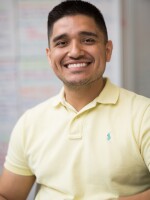New COVID-19 cases and hospitalizations in the area are declining, but they are still well within the threshold to keep Austin and Travis County at stage 3 of Austin Public Health's risk-based guidelines.
The city's interim medical director previously had said numbers might drop low enough to move down to stage 2 by mid-April. That likely won't happen now until the end of the month or the beginning of May.
"These numbers are still decreasing, but they're decreasing very slowly," Dr. Mark Escott told a joint meeting of the Travis County Commissioners Court and the Austin City Council on Tuesday.
"I anticipated that the projections for April were going to flatten out, and that's what we're seeing here," he said of the latest projections from the UT COVID-19 Modeling Consortium.
Escott said the local mask mandate and increased efforts to prevent transmission could push numbers down more quickly and that any surge would be "sub-overwhelming."
"It's unlikely for us to see a surge that is going to threaten the health care infrastructure," he said.
APH is still tracking whether spring break activities and Easter gatherings had an effect on COVID numbers. As the end of the school year approaches, Escott said he's been hearing from school districts about planning for safe graduation ceremonies.
"Right now if we keep the current restrictions in place — the mask mandate, the protections we have in place — things are looking pretty good for graduation time [at] the end of May," he said.
Also Tuesday, Director Stephanie Hayden-Howard said 7,500 first-dose vaccine appointments were scheduled Monday through the online portal after APH opened availability to people aged 40 and older.
"We actually had more people looking for vaccines than we had appointments," Hayden-Howard said. The previous two weeks, APH had leftover appointments because of technical glitches and tighter restrictions on eligibility.
District 4 Council Member Greg Casar expressed concern about lower vaccination rates among Black and brown communities in the Austin area, highlighting that disproportionate rates of vaccinations were expected early since the area's older population skewed more white.
"But now that we're past that phase, I think figuring out how to make sure those front-line, front-facing workers get vaccines is really important," he said. "How do we get to those folks that are sometimes still pulling two jobs ... who might be in their 30s or 40s, but [are seeing] so much more transmission in their community."
Got a tip? Email Jerry Quijano at jerry@kut.org or Trey Shaar at tshaar@kut.org. Follow Jerry on Twitter @jerryquijano and Trey @treyshaar.
If you found the reporting above valuable, please consider making a donation to support it. Your gift pays for everything you find on KUT.org. Thanks for donating today.












